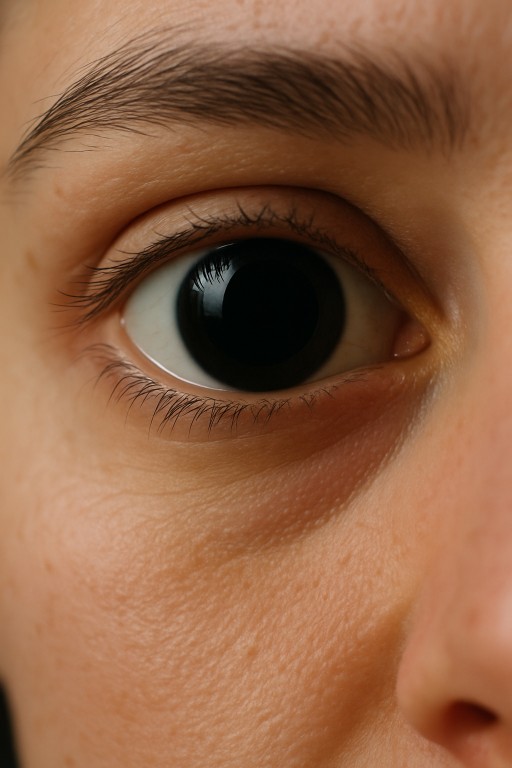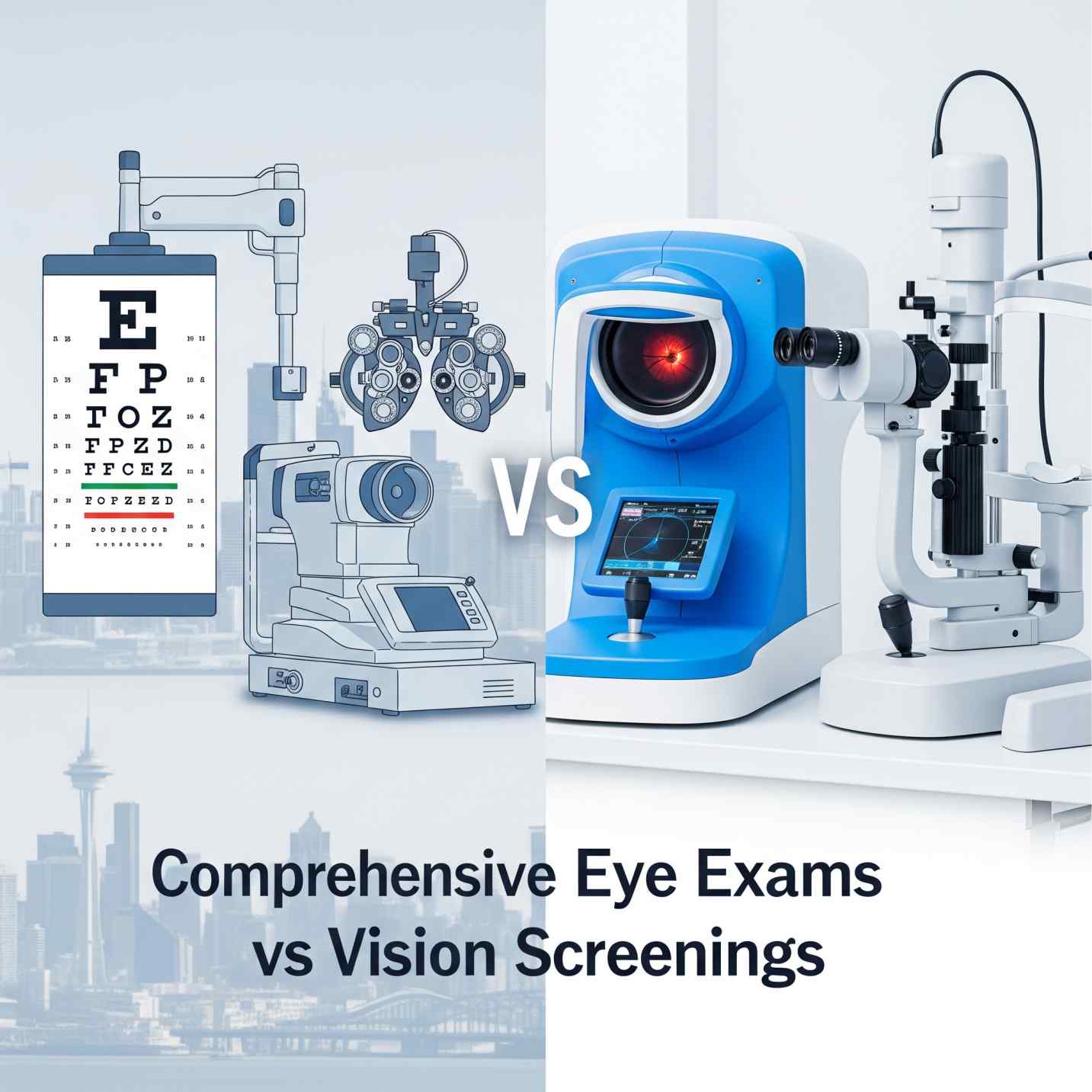Complete Guide to Pupil Dilation at Cannon EyeCare
What is Pupil Dilation?
Dilation uses specialized eye drops to temporarily enlarge your pupils. At Cannon EyeCare in Seattle, we apply these drops to both eyes, allowing your iris muscles to relax and pupils to widen. Without dilation:
-
Light exposure causes pupils to constrict naturally,
-
Severely limiting our view of critical structures like the lens (where cataracts form) and retina.
The retina (or fundus) is your eye’s light-sensitive nerve layer—and a clear view is essential to detect Seattle-common conditions like glaucoma and diabetic retinopathy during comprehensive exams.
Why Dilated Exams Are Essential for Seattle Patients
Dilation unlocks a complete view of your eye health. Without it:
-
Optometrists see only 10-20% of your retina,
-
Missing ~85% of critical tissue where diseases begin.
A dilated exam at Cannon EyeCare reveals:
-
The full retina surface for early detection of diabetes/glaucoma,
-
Your crystalline lens (cataract development zone),
-
The vitreous (home to floaters and debris).
For Seattle residents, we include dilation in annual exams—delivering deeper analysis without extra cost.
Invest in prevention: Maximize your eye health investment through comprehensive dilated screening.
Managing Dilation Side Effects: A Seattle Patient’s Guide
While dilation extends exam time and involves bright lights, temporary side effects are the primary consideration. At Cannon EyeCare, we prepare you for:
-
Blurry near vision (especially noticeable when reading/using devices),
-
Heightened light sensitivity (Seattle’s overcast days help, but sunglasses are essential).
These effects typically last 3-6 hours, making it impractical to:
→ Return to desk work immediately,
→ Drive safely (we require a driver for dilated Seattle patients).
Optomap® or Dilation? Your Seattle Retinal Exam Options
At Cannon EyeCare, we offer both traditional dilation and advanced Optomap imaging for retinal health. Here’s how they compare for Seattle patients:
Traditional Dilation Exam:
-
The gold standard for complete retinal analysis
-
Reveals 100% of retina, optic nerve, and blood vessels
-
Critical for detecting Seattle-common conditions:
→ Diabetic retinopathy
→ Glaucoma progression
→ Macular degeneration -
Requires 20+ minutes with temporary light sensitivity/blurred vision
Optomap® Wide-Field Imaging:
-
Dilation-free alternative capturing 82% of the retina
-
Completed in under 5 minutes
-
Ideal for:
→ Routine screenings
→ Low-risk patients
→ Quick check-ups between dilated exams -
Limitation: May miss peripheral retina issues
Which is Right for You?
Our Seattle optometrists recommend based on your profile:
-
Choose dilation if:
→ You have diabetes or a family eye disease history
→ Experience vision changes or floaters
→ Need a comprehensive analysis of Pacific Northwest-specific risks -
Optomap suits:
→ Annual preventative screenings
→ Time-sensitive urban professionals
→ Dilated exam follow-ups
We personalize your exam based on age, symptoms, and regional risk factors – because Seattle’s unique environment demands tailored eye care.
Understanding Pupil Dilation: Why It’s Done
Why Pupil Dilation Matters for Seattle Eye Health
At Cannon EyeCare, pupil dilation uses specialized drops to temporarily enlarge your pupils—unlocking a critical diagnostic window. For our Seattle patients, this procedure enables:
→ Early detection of systemic diseases (diabetes/hypertension) through retinal changes,
→ Glaucoma risk assessment via optic nerve evaluation,
→ Diagnosis of sight-threatening conditions:
-
Age-related macular degeneration
Dilation provides an uncompromised view of internal eye structures—non-negotiable for accurate diagnosis and preventing vision loss in Seattle’s high-risk populations.
Most adults need dilated exams:
-
Every 1-2 years (standard prevention)
-
More frequently if:
→ Over 65
→ Diabetic
→ With a family eye disease history
We tailor frequency to your Pacific Northwest lifestyle factors.
Types of Eye Dilation Drops to Post-Dilation Care
Seattle-tailored dilation protocols use specialized drops:
- Tropicamide: Fast-acting (4-6 hours) for standard Seattle exams
- Phenylephrine: Boosts dilation for complex procedures
- Cyclopentolate: Extended 24-hour dilation for children or severe light sensitivity
How they work: Temporarily relax iris muscles to prevent pupil constriction. Note: Side effects beyond 8 hours? Contact our Seattle clinic immediately.
Retinal Imaging After Dilation
Post-dilation, Cannon EyeCare captures diagnostic images to:
→ Establish baseline records for Pacific Northwest-specific changes
→ Spot abnormalities (hemorrhages/drusen) invisible to Optomap
→ Enable specialist consults across Washington clinics
Post-Dilation Care for Seattle Patients
Comfort & safety protocol:
-
Wear UV sunglasses (Seattle’s glare off water/snow intensifies sensitivity)
-
No driving for 4-6 hours – Use rideshares/light rail
-
Apply preservative-free lubricating drops
-
Delay contacts for 2 hours
Alert us if: Pain occurs or blurriness persists >8 hours
FAQs
-
Wait at least 1–2 hours after dilation before reinserting contact lenses. Dilation drops can temporarily blur vision and dry out your eyes, which may cause discomfort with contacts. For safety, bring glasses to your appointment and ask your eye doctor for personalized advice.


